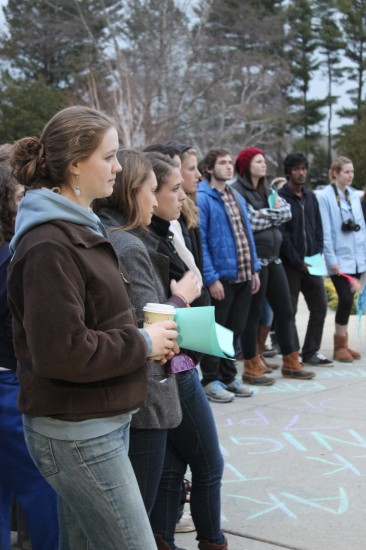
The mood in Coffee Grounds was uneasy as Liz de Lise ’13 tuned her guitar during a lull in conversation. The chairs in the familiarly cozy environment were arranged in a circle to encourage discussion. De Lise offered musical interludes to faciliate the dialogue. Just then, the tension physically manifested itself as one of her strings snapped. Nervous laughter rippled throughout the room; the scene was the opposite of what had occurred only a half an hour earlier. Students had gathered in front of Cro on April 12 at 7 PM despite the threat of rain in order to take part in the annual Take Back the Night march. Take Back the Night is held around the world in protest against sexual violence and abuse.
The first march was held in October 1975, after a young woman in Philadelphia was murdered near her home. The marches are marked by loud cheering and hollering in an effort to, according to the website, “shatter the silence” around sexually based crimes. Candlelit vigils are often held, as well as group discussions. The crowd outside Cro grew as bells, whistles, clappers and other noisemakers were handed out from a behind a table.
After a few minutes, Darcie Folsom, the Coordinator of Sexual Violence Education and Advocacy, and Colleen Bunn, REAL Central Campus Area Coordinator, got the attention of the group and announced that the march would be preceded by a performance by the Shwiffs. Conn’s oldest a cappella group sang two numbers, including Natasha Bedingfield’s “Unwritten,” just as the rain began to fall. Students began marching and cheering from Cro, and moved down past Branford and Smith, around the soccer field, circling around the back of Cro, past Harris and finally ending on the Larrabee green. The march concluded with another performance, this time by Vox Cameli. Afterward, some of the crowd dispersed, and the rest filed into Coffee Grounds for the group discussion portion.
The space was declared “safe and anonymous” by Darcie Folsom. The group was encouraged to open up about their experiences with sexual violence, whether personal or otherwise. In attendance were members of One in Four, an all-male group dedicated to the prevention of rape. An inevitable silence occurred. After the exuberant energy of the rally, the atmosphere abruptly changed to one of solemnity. Slowly, however, people began to speak and share stories about their experiences with family and friends, the powerlessness they felt about helping and about the frustration concerning the size and scope of the issue.
Soon the topic of the talk changed to more fundamental issues. Perhaps, the real source of the problem, someone suggested, was a failure of communication between men and women. Traditional dating rituals, such as the coffee date, have been largely lost in lieu of hook-up culture on college campuses. One boy expressed his frustration at the fact that most attempts at connecting with a member of the opposite sex were often met with accusations of being “creepy.” This statement seemed to resonate with everyone.
Ironically seated in a café, students began to realize that this social meeting ground was being forsaken for non-committal, hastily-made relationships that widen the communication gap between men and women, forcing them to rely more on alcohol to make social interaction bearable. One girl told the story of how she had seen another girl stumbling and confused following tent dance. Not wanting to leave her in such a vulnerable state, she walked up to the girl and introduced herself, and offered to walk her to her room, which she did.
While this small contribution might seem minimal, the room agreed that it is small acts like this that can mean the difference between cases of potential sexual abuse. •









